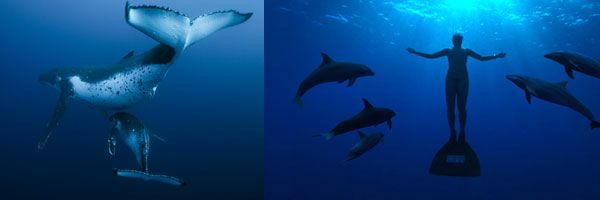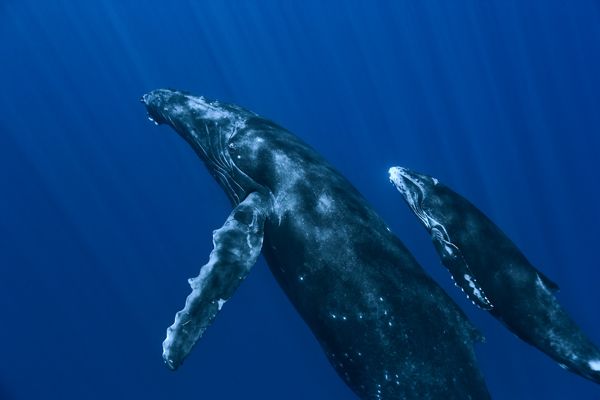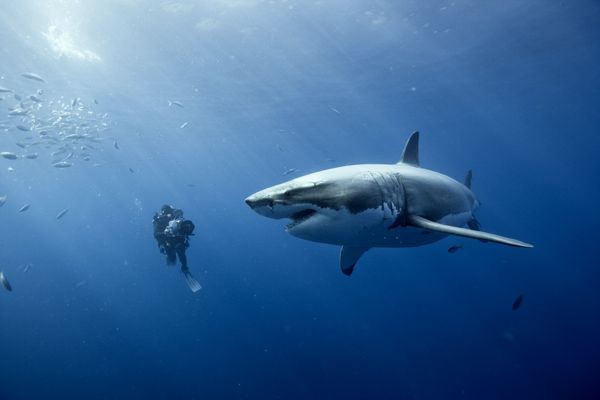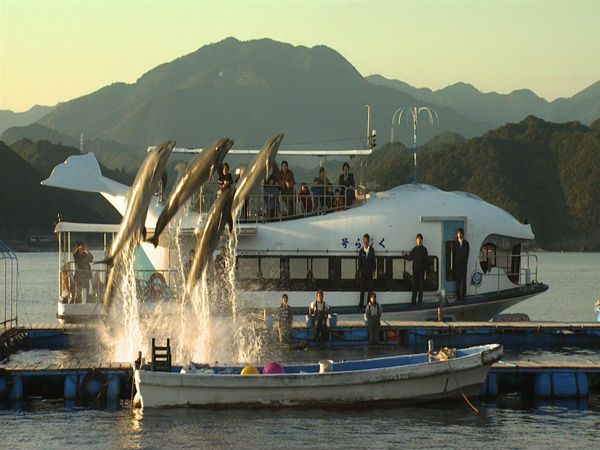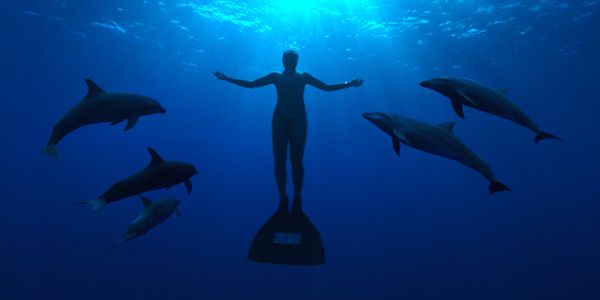"Oceans" and "The Cove" took decidedly different paths on their way to being screened at the 2009 Tokyo International Film Festival (Here's my first article on the Fest). "Oceans," from French directors Jacques Perrin and Jacques Cluzaud, a film which is at turns a breathtaking nature documentary and an exhortation to protect the beauty and majesty of the sea, was a natural choice to open the world's only environmentally minded film festival. "The Cove," on the other hand, almost did not make the cut despite its previous festival successes, including the Audience Award at Sundance. The film, directed by famed National Geographic photographer Louie Psihoyos, also stresses ecological responsibility but does so by exposing the shady slaughter of dolphins by fisherman in the Japanese fishing town of Taiji. Hit the jump to explore the deep blue.
"Oceans"
"Oceans" is a movie that has to been seen to be believed. The footage, which was painstakingly gathered over several years, is nothing short of remarkable. And I say that having already seen Planet Earth. A joint venture among Walt Disney Studios and the French studios of Notro Films and Galatee Films, the movie does take advantage of the enviro-soapbox but it is still able to entrance the audience by providing a glimpse into the power and mystery of the oceans.
The following are a few of my favorites scenes. Seabirds dive-bombing a school of fish while dolphins and sharks circle around waiting for would-be escapees. A brilliantly colored conch taking a quick stroll outside of its shell. A school of fish playfully encircling a whale. A pod of humpback whales breaching together. A clash of king crabs that puts "Braveheart" to shame. Killer whales lunging out of the shallows for some lunch. And on top of that, there were a number of scenes featuring creatures I did not even know existed.
Perrin, who you may remember as the producer of "Winged Migration," is the driving force of the movie. His infrequent narration gives the film a loose structure while allowing the audience to drift along the visual tides. He makes a very cogent argument at the end of the film, saying that humans, in their Icarian eagerness to reach the stars, forgot to look back and see the beauty and mystery that already surrounded them. This tragic mistake has led to the devaluing of the oceans and their subsequent disrepair. Of course, like Captain Planet says, the power to change this is yours.
"The Cove"
Ric O'Barry would agree. After trailblazing the way for successful dolphin training on the television series "Flipper" (and earning his fair share of fame and fortune), O'Barry gave up his career following the apparent suicide of Kathy, one of the five Flipper bottlenose dolphins. For the past 38 years he has been working tirelessly against dolphin captivity.
"The Cove" sees him team up with Psihoyos as they put together a team of trained professionals to execute an operation that Danny Ocean would be proud of. In short, using a combination of military grade technology, marine covert ops and some movie magic, they were able to capture brutal and unforgiving footage of the dolphin massacre that happens annually in the secluded, police protected cove. Add to that the revelation that the dolphin meat, which contains levels of mercury 20x greater than can be safely consumed, is routinely packaged and sold as other fish, and you can start to understand why the festival's corporate sponsors were rumored to have pressed for the film to be excluded from the festival.
"The Cove" is at its best when the complicated themes of corporate greed and cultural relativism intersect with one man's restless quest for redemption. O'Barry readily acknowledges that his work on "Flipper" is one of the main reasons why dolphin exhibitions have become a multi-billion dollar industry. Throughout the film he explains just how sentient dolphins are and why his role in shackling them is a black mark he may never be rid of. What cannot be questioned is the response that this film is already eliciting. At the last minute, too late to be advertised by anything more than a paper handout, it was reinserted into the festival's schedule. And then promptly sold out. In fact, of the press screenings I attended, it was the only movie to receive applause at the end.
I believe that is because "The Cove" and, to a lesser extent, "Oceans," are movies that force us to reconsider the power of the individual and the meaning of personal responsibility. They challenge us to make a difference, to be the difference. Needless to say, I am looking forward to seeing the reaction to the public screening later this week.
"The Cove" will be available on DVD December 8. "Oceans" comes out April 22, 2010.


